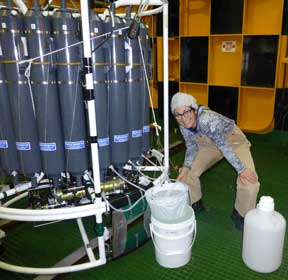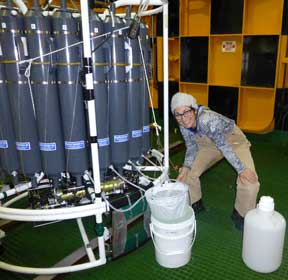 NARRAGANSETT, R.I. – February 23, 2015 – Francoise Morison took a rather roundabout route to earning a doctorate in oceanography at the University of Rhode Island. A native of France, she moved to Brazil, then to New Hampshire, started a family, tutored children in French, became a marine science docent, and eventually decided to earn a college degree.
NARRAGANSETT, R.I. – February 23, 2015 – Francoise Morison took a rather roundabout route to earning a doctorate in oceanography at the University of Rhode Island. A native of France, she moved to Brazil, then to New Hampshire, started a family, tutored children in French, became a marine science docent, and eventually decided to earn a college degree.
“I was actually looking for a summer program for my daughter,” said Morison of the docent program. “I’ve always been interested in the ocean, my parents took us to the ocean for our vacations, so there was this natural attraction.”
After earning a bachelor’s degree in marine biology at the University of New Hampshire, she worked as a taxonomist counting fish larvae for an environmental consulting company and apprenticed at the University of Washington’s Friday Harbor Laboratories, where she analyzed the pelagic food web and went on weekly research cruises.
“That’s what turned me on to biological oceanography and plankton,” she said. “I guess I’ve always liked plankton. They’re highly diverse, they’re beautiful, and they are really important in the functioning of not only marine systems but the biosphere.”
It was plankton that led Morison, now in her 50s, to the URI Graduate School of Oceanography. She discovered GSO Associate Professor Susanne Menden-Deuer, a plankton expert who later became her advisor, and as Morison said, “We were a good match.”
But it isn’t easy commuting from her home in Mont Vernon, N.H., to Narragansett, so Morison rents an apartment near campus and returns home to New Hampshire on most weekends. Her husband, who runs a company that makes automobile and airplane parts, tries to visit Rhode Island regularly as well.
“It’s a little challenging, but you can’t focus too much on that,” she said. “Sometimes I get a little tired of the back and forth, but if you can just make fun of that and not be stressed, it’s OK. It’s not forever.”
And, she said, the experience has been worth it. She feels energized meeting scientists and learning about their ideas and their research. And she has had some amazing experiences.
In 2012, she spent a month aboard a German research ship collecting plankton between Norway and Iceland and conducting experiments to quantify how much they eat. And in each of the last two years, she has spent a month on a research ship in the waters around Antarctica.
“It was really cool to even go there,” Morison said. “The main purpose of the cruises was to assess feeding strategies of krill at different seasons, but no one was looking at the lower trophic levels, so I did that.”
A typical day on the first Antarctic cruise started at 6 p.m. when she collected plankton samples to use in her experiments. She would then work until 1 a.m., catch a few hours of sleep, check on her experiments at 7 a.m. and spend a few hours entering data before doing it all again. This research is the basis of her doctoral dissertation, which she expects to complete at the end of the year.
“We went to Antarctica in two different seasons, so I’ll be able to compare the plankton grazing to see if there are differences,” explained Morison. “We didn’t find much in the water on the first trip, so that was a little frustrating. But the second time we saw huge phytoplankton blooms with chlorophyll concentrations higher than I ever imagined. That was exciting.”
Part of her research was funded by the Rhode Island Experimental Program to Stimulate Competitive Research, a National Science Foundation program that supports students and researchers in the science and technology fields to increase competitiveness and build a more capable workforce in the state.
Despite being more than twice the age of most of her fellow graduate students, Morison said they work well together.
“I was worried about that at first, but the other students don’t really think of me any differently,” she said. “I don’t take part in a lot of their social life, but while we’re here, we talk about work and personal things without feeling any age barrier. Sometimes I think they like the fact that I have children their age and can relate to them. And they seem to appreciate my perspective.”
As she looks toward life after graduation, she hopes to continue to conduct oceanographic research, and she may pursue teaching jobs in informal settings, like aboard sail training vessels.
“Susanne and GSO made it possible for me to have all these great opportunities, including travel to Portugal, Iceland, Chile, England, Spain, and Hawaii, and it’s all been generously funded,” Morison said. “I couldn’t have asked for anything more.”
Pictured above: URI doctoral student Francoise Morison collects water samples from an oceanographic instrument. (Photo courtesy of Francoise Morison.)

